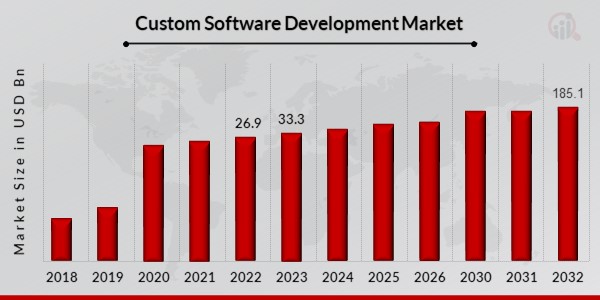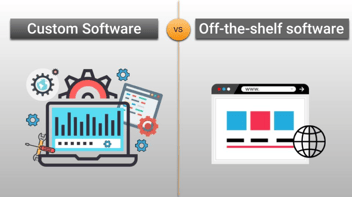Ever thought about the power of custom software? It's like a well-tailored suit, fitting your business just right and making you stand out in a crowd.
It’s not simply about coding. No, it’s more akin to sculpting - taking raw ideas and chiseling them into solutions that transform businesses.
In our journey together through this piece, we'll unravel why bespoke software is no longer an extravagance but a necessity for innovative companies. We’ll compare off-the-shelf solutions with tailor-made ones and shed light on their unique advantages.
We will navigate the process of creating custom software from scratch, discover its role across various industries such as healthcare and retail, explore key features including content management systems (CMS) & customer relationship management (CRM), while offering insights on choosing the right development partner.
The ship stands as a testament to human ingenuity, a beacon of our desire to explore the unknown. It's more than just steel and wood; it's an embodiment of courage and adventure. Each wave it cuts through signifies another challenge overcome, another milestone achieved.
Table Of Contents:
- Understanding Custom Software Development
- The Process of Developing Custom Software
- Advantages of Investing in Custom Software
- Industry Applications of Custom Software
- Features and Functionalities of Custom Software
- Selecting a Custom Software Development Partner
- Case Studies on Successful Custom Software Implementations
- FAQs about Custom Software
- Conclusion
Understanding Custom Software Development
Have you encountered custom software development if you're in the corporate realm? But what exactly is it? Consider custom software development to be like a bespoke suit designed for your company's particular requirements. It's not just about creating an application from scratch; it’s more about developing a software solution that perfectly fits your business processes and goals.
Defining Custom Software Development
Custom software development is the process of designing, building, integrating, scaling, and upgrading software solutions to address the specific needs of users or an organization. Unlike off-the-shelf products like Microsoft Office or Adobe Photoshop - which serve generic purposes - custom-made applications cater directly to your unique business requirements.
This process involves understanding the customer's requirements thoroughly before moving on to planning stages and design phases. It requires expertise in various technologies as well as deep knowledge about user experience and industry best practices.
The Importance of Custom Software Development
In today’s fast-paced digital landscape where one-size-fits-all rarely works anymore, businesses need something more flexible: customized software solutions that help streamline operations management while enhancing productivity levels significantly.
A key stat worth mentioning here is this: The Custom Software Development market End Use is projected to grow from USD 33.3 Billion in 2023 to USD 185.1 Billion by 2032, exhibiting a compound annual growth rate (CAGR) of 23.90% during the forecast period (2023 - 2032).

Industry applications for real-time data analysis are becoming more and more necessary, flexible workspaces are becoming more and more necessary to boost productivity, and low code development platforms (LCDP) are becoming more and more popular to make software development easier, are the key market drivers enhancing the market growth.
Comparing Custom Software with Off-The-Shelf Solutions
To further illustrate this point let’s compare bespoke apps with packaged ones such as CRM systems or content delivery platforms readily available online:
- Off-the-shelf solutions may cost less and be easier to implement, yet they might not satisfy all your company's requirements or necessitate considerable alteration (which can prove expensive).
- On the other hand, custom software development provides a solution specifically tailored to your operations management. It offers you the flexibility to tweak it as your business grows and changes. This might involve anything from unique workflow-based resource planning systems to mobile apps that boost productivity.
The Process of Developing Custom Software
Developing custom software is an art that combines understanding business requirements with technological prowess. Building a custom software application is akin to constructing a structure, requiring consideration of individual specifications and demands from the very beginning.
Gathering Business Requirements
To create effective custom software applications, it's vital first to understand what your business truly needs. This process involves in-depth discussions with stakeholders about their goals and challenges. Imagine this as a brainstorming session where all parties throw ideas on the table - nothing too small or big.
This step helps identify crucial features for your tailor-made software solution, ensuring every dollar spent contributes directly towards meeting specific objectives. Did you know that around 80% of traditional off-the-shelf software features are rarely used? By focusing only on necessary functionality during development, businesses can avoid such waste and save time.
Designing and Prototyping
The next stage is akin to drawing blueprints for a new home - designing & prototyping based on gathered requirements. The design team crafts initial designs representing how different components will interact within your customized solution – think sketches before painting a masterpiece.
A prototype is then built – it’s similar to creating mini models before constructing skyscrapers. Testing these prototypes gives invaluable insights into potential issues or improvements needed before diving head-first into full-scale implementation. Studies have shown that thorough testing reduces wasted resources by identifying underused features early in the process.
Crafting custom software solutions may appear to be a daunting challenge, but with the correct strategy and resources it is attainable. By gathering precise business requirements and using them to guide design & prototyping phases, businesses can develop custom solutions that truly meet their unique needs while saving time and resources.
Advantages of Investing in Custom Software
The decision to invest and build custom software can feel daunting. But let's put the cards on the table: it's a strategic move that often leads to significant advantages over packaged, off-the-shelf options.
Tailored Solutions for Specific Business Needs
Custom software provides the opportunity to craft a solution that fits your business needs and goals precisely. Instead of wrestling with rigid, pre-built software that might not align with your operations or growth plans, you get an application designed just for you. That’s like trading in a one-size-fits-all suit for a bespoke Savile Row creation.
This personalized approach enables greater efficiency and streamlined processes because every feature works exactly how you need it to work. Imagine trying to use Microsoft Office as CRM software - clunky at best. With customized applications, though, they fit into your day-to-day operations like a hand-in-glove.
No more superfluous functions clogging up your workspace; no longer contending with instruments that don't precisely do what you want them to. It's just smooth sailing all the way.
Increase Profits by Saving Time & Reducing Tedious Tasks
Bespoke solutions are also time-savers, which directly translates into cost savings. They automate repetitive tasks so staff can focus on areas where their skills truly shine – increasing productivity and profits simultaneously. According to CEO Blog Nation, 80% of companies report time savings due to automation.
With custom software, you also get the bonus of scalability. Your business is growing and changing – your software should be able to do the same. No more hitting a wall with rigid, off-the-shelf solutions. Custom applications grow alongside your enterprise, ensuring they continue providing value over time.
Ownership & Support
Last but not least, investing in custom software gives you complete ownership - no recurring licensing fees or dependence on third-party vendors for updates and support. And if an issue arises? Your development team will fix it promptly because nobody knows your system better than those who built it from scratch.
Though the initial costs may appear higher than pre-made solutions, it is essential to consider the bigger picture - encompassing long-term savings and advantages that can outweigh these upfront expenses. This includes long-term savings and benefits that can outweigh these upfront expenses.
Industry Applications of Custom Software
Custom software has been revolutionizing how businesses operate, making a major impact in different industries. From healthcare to retail and e-commerce, tailored solutions have provided significant advantages.
Custom Software in Healthcare
The healthcare industry has seen the transformative power of custom software firsthand. Tailored solutions are aiding professionals not only in patient care but also operational efficiency.
Hospital management systems, for instance, streamline day-to-day operations, while Electronic Health Records (EHRs) give practitioners easy online access to vital medical data (source).
A study from the Standish Group shows that such customized applications can save time by ensuring critical features are used more frequently than with packaged software like Microsoft Office or Adobe Photoshop (Standish Group).
Custom Software in Retail and E-commerce
In the realm of retail and e-commerce, tailor-made software is enhancing customer relationship management (CRM), inventory control, and content delivery apps, among others. For example, POS technology uniquely built for McDonald's allows them to process orders efficiently, increasing profits.

Bespoke mobile apps like Amazon’s marketplace platform provide an optimal user experience designed specifically for their unique business model. Uber leverages its proprietary tech stack for seamless ride coordination between drivers and riders. This proves why big players such as Google and Netflix choose custom over off-the-shelf options when it comes down to addressing their specific needs - they know bespoke offers them a strategic advantage (source).
As we see, custom software has proven its mettle in diverse sectors. But remember - it's not a one-size-fits-all solution. Every business needs to evaluate their requirements and then decide whether a customized application designed specifically for them would be beneficial.
Features and Functionalities of Custom Software
In the rapidly evolving digital landscape, businesses must stay ahead of their competition. One way to do this is by leveraging custom software developed specifically for your unique business needs. At DePalma Studios, we specialize in designing and developing custom-made software applications that offer a myriad of features and functionalities.
User-Friendly Interface
The first noticeable feature of our custom software is its user-friendly interface. We design interfaces that are intuitive, easy to navigate, and visually appealing - all aimed at providing an optimal user experience.
Scalability & Flexibility
A key advantage of custom-built software over off-the-shelf solutions is scalability. As your business grows, so too can your software application – accommodating increased data volumes or additional users without compromising performance or efficiency. Additionally, our bespoke solutions provide flexibility as they can be modified or updated based on changing business requirements.
Data Security
In today's world, where cyber threats are prevalent, ensuring robust data security has become paramount for any organization. Our custom-designed applications have enhanced security measures to protect sensitive company information from unauthorized access or breaches.
Integration Capabilities
An often overlooked but vital aspect of modern-day operations involves seamless integration between different systems within an organization’s IT ecosystem. Our team ensures that the customized solution will work harmoniously with existing platforms like CRM systems, ERP (Enterprise Resource Planning), or other third-party tools you may use - thus streamlining workflows and enhancing operational efficiency.
Remember: while these represent some core features typically found in DePalma Studios' custom software, the beauty of a bespoke solution is that it can be designed with any features and functionalities you need. That's the power of customization - it’s all about making your business more efficient, competitive, and future-ready.
The landscape of business technology is evolving, with 87% of IT leaders agreeing that custom software applications are leading the way. These unique solutions built to meet specific needs offer functionalities not found in off-the-shelf packages. But what sets them apart?
Understanding Content Management Systems
A key feature in many custom software builds is an integrated content management system (CMS). Unlike generic CMSs like WordPress or Drupal, a bespoke CMS lets you manage digital content effectively while aligning it closely with your operational requirements.
Say goodbye to bloated features you never use. With a tailored CMS, only those modules relevant to your day-to-day operations get included. This reduces clutter and makes sure everything runs smoothly for easy online access.
The Role of Customer Relationship Management Systems
Beyond managing content, modern businesses need robust tools for relationship management. That's where CRM systems come into play - they enhance customer relationships and improve sales performance by keeping track of all interactions in one place.
Compared to popular CRMs such as Salesforce or Microsoft Dynamics 365, custom-built CRMs can be designed specifically around your company's processes rather than forcing you to adapt. They make managing customers' information easier by providing functions precisely suited for your team's workflows.
Software Solutions Built Around Your Needs
Suppose we dive deeper into the functionality pool offered by customized software development services. In that case, we find features like advanced resource planning and operations management tools that help businesses stay on top of their game. These solutions not only simplify tedious tasks but also offer a way to save time and increase profits.
Just think about it: A custom software solution can pack all the features you need, like project management and issue tracking. It lets you skip what your business doesn't use. This way, you get an efficient system that's designed just for your needs.
Selecting a Custom Software Development Partner
Choosing the right partner for your custom software project can make or break its success. Let's delve into what to consider when selecting a development team.

Evaluating Expertise and Experience
When selecting a development team, evaluating their expertise and experience should be the primary focus. Do they have prior experience in building custom solutions similar to yours? Can they understand your unique business goals?
A seasoned development team knows how to navigate through potential challenges that may arise during the software development process. Their expertise evaluation could be crucial in saving time, reducing tedious tasks, and ensuring smooth operations management of your project.
But don't just take their word for it - ask them about past projects where they've demonstrated these skills. You want a partner who doesn't just talk the talk but also walks the walk.
Technical Support Capabilities
It would be best if you had someone who can not only construct top-notch software but also be ready to tackle any difficulties that could arise after the launch.
This is where technical support comes into play. Your ideal partner should offer robust post-launch support services. They must be equipped with an efficient issue-tracking system and able to provide prompt help whenever needed.
Cultural Fit Matters Too.
Beyond technical capabilities, cultural fit matters, too. Does this team align with your company values? Are their communication style and work ethic compatible with yours?
If there’s friction between teams due to differing cultures or working styles, even if minor, it could lead eventually snowball into bigger issues, hampering the progress of your project.
In summary, selecting a custom software development partner involves much more than just their coding skills. You need to consider their experience, support capabilities, and cultural fit as well. By considering all these factors, you're on your way to finding the perfect match for your project.
Case Studies on Successful Custom Software Implementations
The world of custom software development is rife with stories of transformative success. Let's explore some real-world examples highlighting the power and potential of tailor-made software solutions.
Revolutionizing Healthcare: A Tailored CRM Solution
A top healthcare provider had difficulty dealing with patient data practically, leading to numerous delays in their daily activities. They adopted a customized Customer Relationship Management (CRM) system designed explicitly for healthcare.
This new system allowed them to streamline patient information management, automate tedious tasks like appointment scheduling, and significantly enhance service delivery efficiency. The result? A drastic reduction in administrative errors and an improved patient experience prove that customized solutions can revolutionize industry operations.
Retail Reimagined: Bespoke POS Technology
In another case study from the retail sector, an innovative startup aimed at reshaping how retailers handle point-of-sale transactions turned towards custom-built software as their solution.
Faced with unique business needs not addressed by off-the-shelf products, they worked closely with a development team to create custom POS technology.
This cutting-edge application helped simplify payment processes while providing critical insights into customer purchasing habits - driving increased profits through better-informed business decisions. It’s yet another instance where building custom paid off big time.
These cases aren't isolated successes but exemplify what happens when businesses choose bespoke over generic.
So whether it's managing your customer relationships more effectively or revolutionizing your retail operations, custom software holds the key to solving unique business challenges and driving success.
FAQs about Custom Software

What is custom software, for example?
Custom software, or bespoke software, is tailor-made to fit a specific business's needs. For instance, Uber's ride-hailing app was built specifically for its unique business model.
What are the different types of custom software?
The various types include Content Management Systems (CMS), Customer Relationship Management (CRM) systems, mobile apps and Enterprise Resource Planning (ERP) systems—all customized based on a company's requirements.
Who owns custom software?
The ownership rights typically belong to the entity or individual who commissioned it. This allows them full control over updates and modifications without restrictions common in off-the-shelf solutions.
How do you create custom software?
To create your custom solution, you need to understand your requirements first. Then, design and prototype it before building it out fully with help from an experienced development team.
Conclusion
Custom software isn't just about coding. It's sculpting solutions carving pathways to innovation and efficiency.
The expedition we've been on has demonstrated that bespoke software is more than a luxury - it's an essential asset for today's organizations. From healthcare to retail, it brings value across industries.
We've seen the process of creating these unique tools from scratch, learning how they fit each business like a tailored suit. And with features such as content management systems (CMS) & customer relationship management (CRM), they offer unmatched functionality.
Selecting the right development partner requires care and consideration—but once you have found them, the possibilities are endless!
The Custom Software Development market is expected to grow significantly in the coming years. It is projected to expand from USD 33.3 Billion in 2023 to USD 185.1 Billion by 2032, with a CAGR of 23.90% during the forecast period. This growth can be attributed to the increasing demand for real-time data analysis in various industries and the need for flexible workspaces to enhance productivity. Additionally, low code development platforms (LCDP) are gaining popularity as they simplify software development processes. These factors are driving the market's expansion and shaping its prospects positively.





